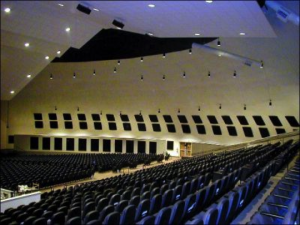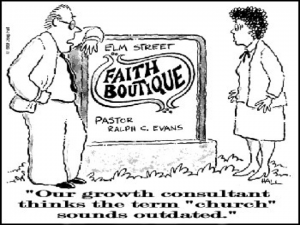Prior to the 1960’s most American churches were small and provided a very utilitarian function. The church would transport people into communion with God by providing basic necessities for living a Christian life. However, by the late 60’s and 70’s, the Baby Boomer culture had grown up and many had stopped going to church all together. The culture of our country had changed. Secular values, youth culture, and entertainment had taken root in the fabric of our nation and the church could no longer compete. Churches that were built for utility struggled. However, there were some pastors that began to ‘tinker” with the way we have done church up to that point, attempting a “new purpose” for the church.
Allow me to digress and take a snapshot of another industry in this same time period. At one point in American history New York harbor was bustling with activity as ocean-going vessels brought immigrants to America. These ships that transported people served a utilitarian purpose that simply moved people from point A to B – that is why they were called “liners.”
The glory days of ocean liners began to fade in the late 1950’s when the first jetliner traveled in six hours what took ocean vessels six days to travel. Many of the great vessels of the day were being harbored and sold for scrap. People begin to declare this industry to be over. They were severely wrong! Many of the ship owners began to “tinker” with the way this industry had conducted itself up to this point in history.
New ships emerged and now transported people on a “wondering journey” to exotic ports-of-call. A new mindset was established that we are moving from point A to B, rather we are now on an exotic journey wondering the oceans of the world – vacation travel was being born. New innovative ships were being built. The Titanic was the “Oasis of The Seas” in its day.
 Like cruise ship owners looking for new markets to explore, “pastorpreneurs” found that people would attend church in a post-Christian culture if it appealed to their “felt-needs.” Instead of seeing the church as a means to an end – the church was now the end itself. If the culture was no longer interested in connecting with God, then perhaps we can get them to connect with their inner-self and desires. Churches began to connect along the lines of building community, kids, marriage retreats/programs, or even Christian entertainment. Perhaps this approach would draw people back to the pew? The result seems to be high-energy music venues, drama, and therapeutic sermons in a hope that people will find God. Here is the million dollar question; “If the church begins with the attendee’s desires in mind, is the church acting just like the early American cruise ship owners who want to take people on an adventure?” If this is true then are we connecting people to God or connecting them to “our ministry”
Like cruise ship owners looking for new markets to explore, “pastorpreneurs” found that people would attend church in a post-Christian culture if it appealed to their “felt-needs.” Instead of seeing the church as a means to an end – the church was now the end itself. If the culture was no longer interested in connecting with God, then perhaps we can get them to connect with their inner-self and desires. Churches began to connect along the lines of building community, kids, marriage retreats/programs, or even Christian entertainment. Perhaps this approach would draw people back to the pew? The result seems to be high-energy music venues, drama, and therapeutic sermons in a hope that people will find God. Here is the million dollar question; “If the church begins with the attendee’s desires in mind, is the church acting just like the early American cruise ship owners who want to take people on an adventure?” If this is true then are we connecting people to God or connecting them to “our ministry”
This realigning of the church has triggered massive growth in the size of congregations. Logic seems to dictate that larger churches, like larger cruise ships, can offer more choices to address needs and desires. Church growth went from a by-word to the missional purpose of the church. What we are watching in the church world was unimaginable only a few years ago. Think about it – gymnasiums, health clubs, production studios, coffee shops, bookstores and more have all radically reshaped our understanding of ministry. Mega churches have flourished in this new religious environment.
Today, it is reported that half of all churchgoers attend the largest 10% of churches. What we seem to overlook is on average 50 churches per week are closing their doors. The church as a destination model has not advanced the church in America, it has consolidated it.
In the next installment of this series, I will examine how relevance can backfire when it overshadows the church uniqueness. LEAVE a comment and begin a dialogue. I will respond to every comment.

Bro. Gary,
You speak of churches closing their doors and the consolidation of churches. Is it possible for there to be too many churches? Recently some Christian brothers and I were having lunch and one mentioned that there are over 80 churches in Franklin County. We discussed how it seem that churches compete with one another for attendees. Is that what God wants? Does having a church on every corner hinder the Gospel message? Could the closing of so may churches be God’s way of weeding out the churches that are not effective? And one last question: How is it that one church can barely draw 50 people on Sunday morning while a church right next door to it has overflow crowds?
I apologize for the lengthy comment but these are questions that have been bugging me for awhile now.
Brian,
Thanks for your response and questions. I am not sure that having too many churches is the issue if in fact these churches are reaching a segment of our community that no other church is reaching. However if we are just cloning each other with sameness that can be bland and leave people out. Our goal is to target the lost. The shepherd left the healthy herd of sheep to locate one that was lost. I would also agree that it is possible that God is “weeding out” churches as you stated. I believe that churches that are not relevant are going out of business. If we make the church instead of the cross the destination then it is only a matter of time before that church diminishes. I believe the first order of a church is HEALTH – growth will come! Thanks Brian great questions.